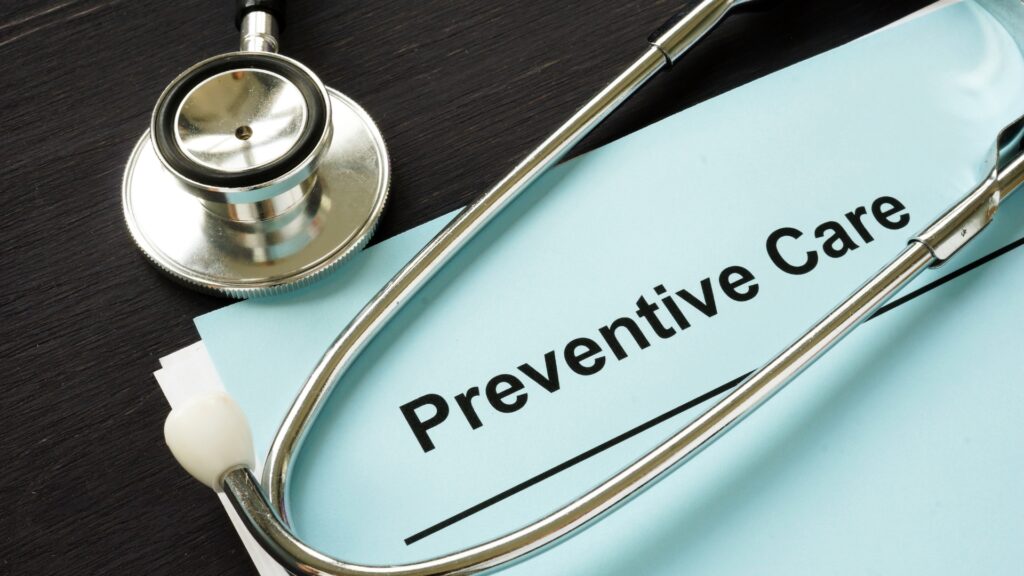Sharing is caring!

Regular check-ups and preventative treatment are essential elements of healthcare that work to spot and stop possible health problems before they worsen. These services help medical professionals identify and address health issues early, improving patient outcomes. Preventative care and routine check-ups also contribute to lower healthcare expenses by avoiding the necessity of costly hospital stays and treatments.
To preserve excellent health and identify health issues early, preventative treatment and routine check-ups are essential. Through preventative treatment, many chronic illnesses can be avoided or managed more successfully. Mammograms and colonoscopies, two common check-ups, can also find cancer early, improving the likelihood of successful treatment.
The new technology and advancement in capabilities of Artificial Intelligence have incredibly improved patient care and possibilities.
Benefits of Preventative Care
Preventative care refers to medical services that aim to prevent the onset of health problems or detect them early on before they become more severe. These services include routine check-ups, vaccinations, health screenings, and lifestyle counseling.
The benefits of preventative care are many.
- Better health outcomes, early detection of diseases, and preventive care drastically improve the quality of life for patients.
- Preventative care can also lower healthcare expenses by avoiding costly hospital stays and treatments. According to studies, some preventative services provide a return on investment of up to 40 to 1, making them a financially advantageous approach to preserving excellent health.
Role of healthcare providers in preventative care:
Delivering preventative care services is crucially dependent on healthcare providers. They provide their patients with resources and skills for leading healthy lives, including tips on diet and exercise. They also participate in vaccinations, regular check-ups, and health tests to identify any health issues early. The patient’s medical history and risk factors may also influence the providers’ recommendations for specific preventative measures.
Importance of Regular Check-Ups
Routine check-ups are scheduled appointments with a healthcare professional, such as a primary care physician or a specialist, to discuss a person’s general health and well-being. These consultations could include physical exams, health screenings, and discussions of any symptoms or health problems.
Importance of regular check-ups
For preserving good health and delaying the beginning of significant health problems, routine check-ups are crucial. Patients will receive better care if medical practitioners can spot potential health risks early and act quickly to stop them from getting worse.
Also, keeping up with recommended immunizations and health screenings through routine checkups can help people lower their chance of contracting diseases that are avoidable. At these appointments, healthcare professionals can also offer advice on healthy living and counseling on issues like stress reduction, exercise, and diet.
Role of healthcare providers in regular check-ups
Healthcare providers are the first point of contact in times of healthcare emergencies. For example, primary care doctors are the first to provide people with healthcare assistance. They do various examinations such as routine physical examinations, administration of vaccinations, and more.
Regular checks can also be used by doctors to educate about preventative care, suggested screenings, and healthy lifestyle suggestions. Healthcare providers can help patients retain good health and delay the onset of significant health conditions.
Challenges in Delivering Preventative Care and Regular Check-Ups
Despite the numerous benefits of preventative care and regular check-ups, healthcare providers face several challenges in delivering these services effectively. Some of the common challenges include:
- Patients are not adequately informed or made aware of the value of preventative treatment and regular check-ups.
- Insufficient budget and resources to offer these services.
- The difficulty of accessing underserved populations, such as those living in rural areas or low-income neighborhoods.
- There is insufficient financing for preventative care, thus treating acute illnesses is prioritized above preventing them.
- Limited time during appointments to address preventative care needs, as healthcare providers may be focused on addressing immediate health concerns.
How to overcome the challenges
To get over these challenges, one can employ several strategies, such as:
- It is vital to educate patients about timely check-ups and the importance of preventive care. Healthcare providers could do so by doing regular check-ups through outreach programs, social media, and other avenues of contact.
- Enhance finance and resources for services and activities that promote prevention, such as through grants or collaborations with neighborhood organizations.2. Enhancing financing and resources for services and activities that promote prevention, such as through grants or collaborations with neighborhood organizations.
- Using cutting-edge strategies to reach marginalized communities, such as mobile clinics or telemedicine.
- Promoting legislative measures that strengthen preventative care and boost payments for these services.
- Incorporating preventative care into routine appointments and prioritizing the delivery of preventative services alongside acute care.
Importance of healthcare providers to adopt the right and timely means of getting healthcare credentialing, enrolment, and revenue cycle management services
To effectively deliver preventative care and regular check-ups, healthcare providers need to ensure that their practices are efficient and optimized. This includes obtaining proper healthcare credentialing and enrollment to participate in insurance networks, as well as utilizing revenue cycle management services to ensure proper billing and reimbursement for services provided. By adopting the right means of credentialing, enrollment, and revenue cycle management, healthcare providers can focus on providing high-quality care and addressing the challenges in delivering preventative care and regular check-ups.
In conclusion, regular check-ups and preventative care are essential for maintaining good health and preventing illnesses. At Apaana Healthcare, we provide healthcare credentialing, enrollment, and revenue cycle management services to help healthcare providers deliver high-quality care. Contact us today to learn more about our services and how we can support your practice.
References
- Centers for Disease Control and Prevention. (2021). Preventive Care. Are You Up to Date on Your Preventive Care? | CDC
- Northwestern University. (2021). Routine Medical Checkups Have Important Health Benefitst. Routine Medical Checkups Have Important Health Benefits – News Center (northwestern.edu)
- Healthcare Weekly. (2023). The Benefits of Preventive Health Care. The Benefits of Preventive Health Care: Ways How Regular Check-Ups and Screenings Can Save You Money – Healthcare Weekly
- American Medical Association. (2021). Preventive Care. 6 steps to ensure patients don’t miss chronic or preventive care | American Medical Association (ama-assn.org





